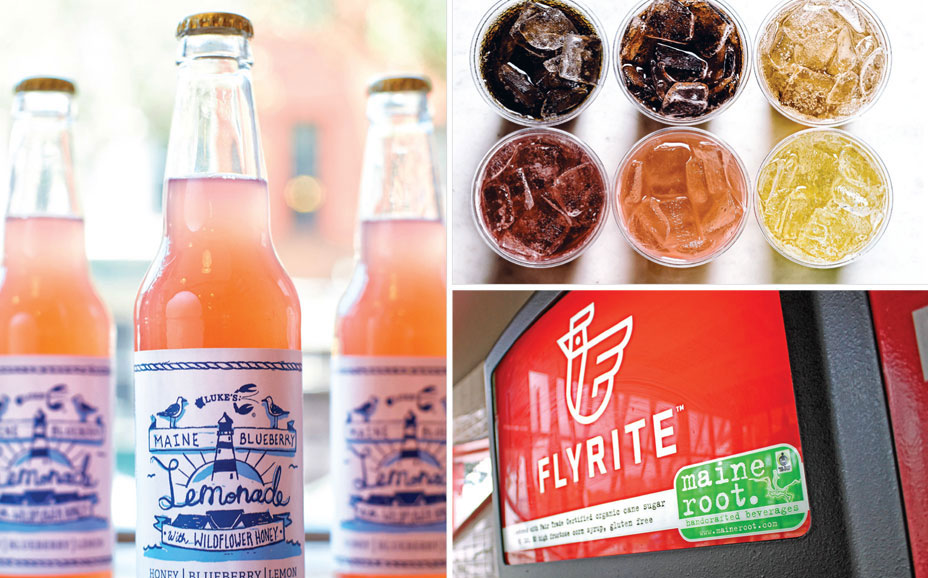Diners’ love affair with traditional soda brands has evolved from a match made in heaven to awkward estrangement. With the Centers for Disease Control and Prevention (CDC) reporting that regular soda is the leading source of added sugars for adults ages 18–54, it’s easy to see why standard soda sales are slipping.
But some fast-casual restaurants are finding a loophole when it comes to bridging the gap between healthy lifestyle trends and dining-out indulgence.
Craft sodas like Maine Root, Appalachian Craft Soda, and Jones Soda, in addition to in-house varieties, are gaining traction thanks to their reputation as a healthier and more natural alternative. Sans corn syrup, these sodas are made with cane sugar, and some are organic and Fair Trade–certified.
Since recent CDC data indicates that half of American adults still drink at least one sugar-sweetened beverage daily, it’s worth investing in these buzzworthy beverages to attract health-minded customers.
“The industry is changing; customers are looking for something with more life to it,” says Benji Rosen, owner of Chicago-area concept Benjyehuda. “You’re removing the harmful chemical aspects of big soda while offering something more curated and cutting-edge.”
Identifiable flavors in sort-of sodas and feel-good brands made by small companies are what today’s high-expectation customers hunt for. “You have a new customer that realizes for a slightly higher price point, they get something that’s truly made fresh,” Rosen says. He’s also found that 25–40-year-olds are open-minded and excited about specialty drinks.
Quality, health, and sustainability are why Ben Conniff, president of Maine-based Luke’s Lobster, believes the brand’s Maine Root and Green Bee beverages shine when compared to the average concept. By using the best quality sodas, guests enjoy the authentic ingredients they seek while benefiting from health bonuses like vitamins and polyphenols (antioxidants that may reduce the risk for cancer and heart disease) from the honey that Green Bee uses as a sweetener.
“[Craft soda] meets the demand of consumers today who don’t want more calories from sugary drinks,” he says. “Whether it’s Maine Root’s organic, Fair Trade, cane sugar soda, or Green Bee supporting bee colonies and sustainable ingredients, they’re better for the environment and local economies.”
Because craft soda addresses the competing desires of wellness and eating-out extravagance, customers can sip a beverage that’s better for them than conventional soda, but still spoil themselves in terms of taste.
“Flyrite’s on that fine line. Are we a health food? Not exactly, but we’re real food in a quick-service, drive-thru, dine-in model. People would rather indulge with something real,” says Kevin Warden, founder and CEO of two-unit Flyrite in Austin, Texas. “That philosophy carries from our menu with no artificial ingredients, MSG, or over-salting to our Maine Root sodas made with real cane sugar.”
But why move away from financially enticing big soda? As Warden sees it, craft soda plays to diners’ changing tastes and fits the “unchain” and real-ingredients trends; it also demonstrates that the brand cares about its products and customers.
As exciting as the craft soda movement may be, operators must still ensure their refreshment program matches the brand identity. “Look at the ethos behind your food and make sure your beverage selection reflects that,” Conniff says. “If you’re committed to food that’s environmentally, socially, and economically sustainable, you should think about that when it comes to drinks.”
At Benjyehuda, Rosen recently switched from big soda to Jones Soda and is thrilled with the change. After frustrating experiences with distribution, service, and ordering, he says, he wanted to collaborate with a business that cared as much about partnership and customers as he did.
“If you’re taking fresh, culinary-driven food to a higher echelon, [craft soda] is more in line with your brand and offers a bigger differentiator,” he says. “Take a look outside of big soda and try to connect with someone you’d want to grow with. Now that we’ve jumped that hurdle, I’m happy with the outcome.”
Beyond putting craft sodas on the menu, certain fast casuals have brought beverage creation in-house. Hotlips Pizza in Portland, Oregon, serves its own proprietary craft beverage line. These fruit sodas came to fruition because big soda didn’t match the flavors and experience of Hotlips’ pizza, which features locally sourced ingredients.
Still, co-owner David Yudkin offers a note of caution: Operators who choose to offer branded soda must charge the premium price and ditch the 99-cent mentality. He says consumers are willing to pay more—to the tune of $3–$5—for higher-quality beverages.
At Washington D.C.–based &pizza, the proprietary &soda brand naturally fits with its customizable eating adventure. It lacks caffeine, has real sugar, and entices customers through unique combinations like Burdock + Anise Root Beer and Cereal Milk Cream Soda. Brand manager Dana Fraser suggests operators take their time and perform market research when creating their soda program.
“I wouldn’t recommend it for every fast casual. If you know why you’re creating it and know the benefits, flavors, and demographics, anyone can do it,” Fraser says. “The culinary innovation side of experimenting is great, as is the luxury of taking a soda off the line if it’s not resonating.”
Whether crafting in-house or partnering up, operators know that natural sodas aren’t an immediate boon to the bottom line. It’s the same case for most if not all initiatives that are “centered around cleaning up what’s dirty about fast food,” as Warden puts it.
But that initial pain point can pay huge dividends down the line. After all, offering and creating specialty sodas not only separates a concept from its competitors, but it also makes the brand more resilient as attitudes around healthy eating and drinking continuing to evolve.
“Short-term, your bottom line hurts, and it’s hard selling at the same margin percentage you achieved with traditional soda,” Conniff says. “But if you take a long-term perspective and see the attitudes shifting towards conventional soda, you can be an early mover towards beverages customers feel better about. You’re going to see a return in being recognized as a company that’s thoughtful.”






